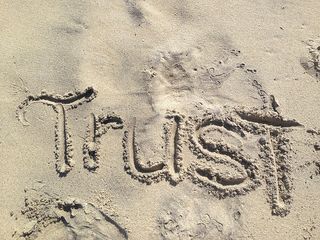Trust
How Can You Tell Who to Trust?
Signs of how much you can trust someone.( Includes a video.)
Posted April 19, 2014

UPDATE: 6/27/14: Because this article has gotten a lot of views and more than 10,000 Facebook Likes, I decided to add a little video to drive a key point home...and hopefully make you laugh. HERE is the link.
Lately, it seems that more drivers are actually speeding up to prevent me from entering their lane on the highway. Since drivers have nothing to gain or lose by being nice, I see it as an indicator of how intrinsically motivated people are to do the right thing.
How can we assess how much we should trust someone?
My own optimism about human nature was first shaken when President Kennedy was killed. It only accelerated when I read about clerics who molest children and who steal money from parishioners. It saddens me to think we can’t unquestionably trust even "God’s emissaries."
Growing up in the era of Walter Cronkite and Edward R. Murrow, I felt that journalists were noble seekers of truth. Now, having written for major media outlets for 25 years, I've learned that ever more reporters are less interested in reporting than in manipulating us into agreeing with them about how the world should be—a rather hubristic goal since many journalists have spent little time in the real world, having gone straight from academia’s bubble to journalism’s.
Every year, thousands of men are victims of paternity fraud. Most can’t imagine they’d be falsely accused and so they don’t get a paternity test. The women perpetrating these frauds count on the men's trust that they would not lie about paternity, and use it to unfairly impel a man to raise some other man’s child (at the cost of hundreds of thousands of dollars).
Then there are the physicians. I want to see doctors as saviors, the people who can protect me from unnecessary illness and premature death. But I recently read that 210,000 to 440,000 patients die every year because of medical mistakes and millions more suffer “excess morbidity,” an antiseptic term for “unnecessary suffering.”
Most personally painful, I was playing a game with one of my closest friends in which we agreed to take turns answering each others’ questions completely honestly. I asked her, “Do you ever have any negative thoughts about me?” I assumed she might say something like, “You can get intense.” Instead she said, “I’m jealous of you so I sometimes think of hurting you.” I was shocked. If you can’t trust even your close friends not to want to harm you, then whom can you trust?
Especially in tough times, people may be less trustworthy than we’d like or expect.
So, how do you figure out whom and how much to trust?
- Before trusting a person, try to determine how often he or she is correct. For example, read Yelp reviews of physicians, not so much to see whether patients like them, but how often the doctors correctly make a difficult diagnosis.
- If you’re thinking of trusting someone with money, assess how financially desperate or materialistic they may be. I'd be a bit dubious of someone who drives a Jaguar and wears a Rolex.
- Most important, I’d want to see if a person acts justly even when it's inexpedient. That is especially key if the person has much to gain by acting against your interest and you’re unlikely to detect it. Many years ago, I went to a new dentist, who told me I needed a crown, though I'd never had one in my life. The next year, he said I needed another one. Before agreeing to it, I got a second opinion—and that dentist was sure the tooth was fine. I changed dentists and over many years, he has never said I needed a crown nor even a filling—and I’ve had no problems with my teeth. But if at some point my dentist says I need a treatment, I’ll trust him.
We have limited control over others but I hope this article at least reminds us that core to the life well-led is striving to be just—and even kind.
Dr. Nemko’s nine books are available. You can reach career and personal coach Marty Nemko at mnemko@comcast.net


